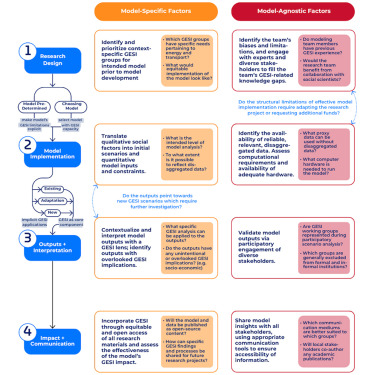
Guidelines for Inclusive and Equitable Energy & Transport Modeling
This perspective presents guidelines, developed through a collaborative process informed by a scoping literature review and expert consultation with modelers and social scientists, for integrating GESI into large-scale energy and transport systems modeling processes, particularly in low- and lower middle-income countries. By addressing key challenges—such as data disaggregation, the limits of current model architectures, and the complexities of quantifying social factors—we outline steps to incorporate GESI considerations throughout every stage of the modeling life cycle.
While developed with energy and transport systems in mind, the principles of these guidelines are broadly applicable to other infrastructure modeling domains. Ultimately, this work demonstrates how inclusive modeling practices can produce more equitable, context-sensitive results, and foster sustainable development outcomes.
- Authors
- Marissa Bergman
- Julia Tomei
- Stephanie Hirmer
- Beatrice Stockport
- Fatima Afifah
- James Dixon
- Leonhard Hofbauer
- Alycia Leonard
- Pietro Lubello
- Elena Pierard Manzano
- Brunilde Verrier
- Margaux Daly
- Neve Fields
- Francesco Gardumi
- Publication Date
- September 19, 2025

Physical Address
No. MK088, Ushindi West Avenue,
Mukuyu Rd (Mukuyu West Wing), Thome 1
Nairobi, Kenya
Organization
Subscribe for newsletter & get news, events and publications updates
Contact Us
Office Tel: (+254) 20 8009928 |
Mobile: (+254) 706 324 467
© 2026 Nuvoni Research

